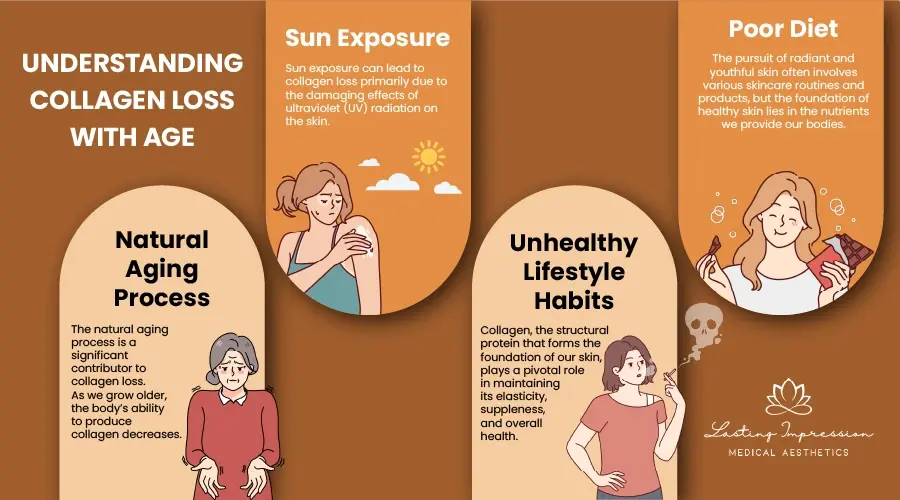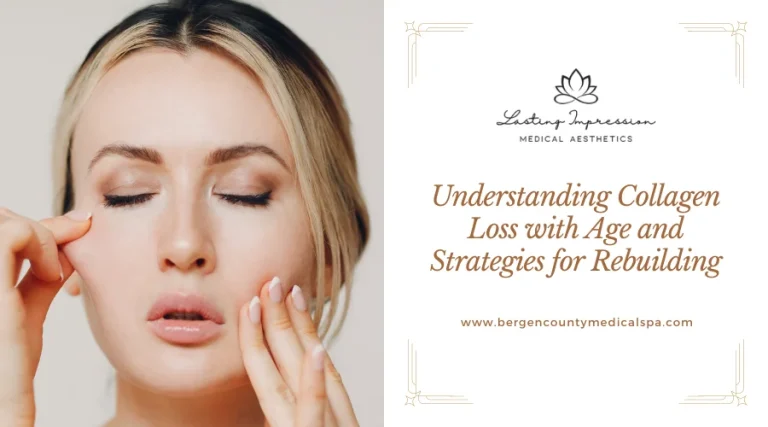Collagen, the most abundant protein in the human body, plays a crucial role in maintaining the integrity and elasticity of our skin, bones, tendons, and connective tissues. However, as we age, the production of collagen begins to decline, leading to various signs of aging such as wrinkles, sagging skin, and joint pain. Understanding why we lose collagen with age and exploring effective ways to rebuild it is essential for promoting overall health and well-being. Below are the most common reasons why we lose collagen overtime.
#1. Natural Aging Process
The natural aging process is a significant contributor to collagen loss. As we grow older, the body’s ability to produce collagen decreases. This decline is part of the intrinsic aging process and affects the skin’s elasticity and hydration, leading to the formation of wrinkles and fine lines.
#2. Sun Exposure
Sun exposure can lead to collagen loss primarily due to the damaging effects of ultraviolet (UV) radiation on the skin. There are two types of UV rays from the sun that contribute to collagen degradation: UVA and UVB.
UVA Rays
- UVA rays penetrate the skin more deeply than UVB rays.
- They are responsible for premature aging by damaging collagen fibers and elastin in the dermis, the middle layer of the skin.
- UVA rays generate free radicals, which are highly reactive molecules that can cause oxidative stress and damage collagen molecules.
UVB Rays
- UVB rays primarily affect the outer layer of the skin (epidermis) and can contribute to sunburn.
- While UVB rays are not as deeply penetrating as UVA rays, they can still induce collagen breakdown indirectly by triggering the production of enzymes called matrix metalloproteinases (MMPs).
- MMPs play a role in collagen degradation by breaking down the collagen fibers in the extracellular matrix.


Effect of Sun Rays to Skin
The combined effects of UVA and UVB radiation contribute to the following processes that result in collagen loss:
- Oxidative Stress – UV radiation generates free radicals in the skin, causing oxidative stress. Free radicals are highly reactive and can damage collagen molecules by breaking them down or altering their structure.
- Inflammation – UV-induced damage triggers an inflammatory response in the skin. Chronic inflammation can activate enzymes like MMPs, which play a role in breaking down collagen and other extracellular matrix components.
- Cross-Linking – UV radiation can lead to the formation of abnormal cross-links between collagen fibers. Cross-linking alters the normal structure of collagen, reducing its elasticity and contributing to the formation of wrinkles and fine lines.
- Collagenase Activation – UV rays can stimulate the activation of collagenase, an enzyme that specifically targets collagen. Collagenase breaks down collagen into smaller fragments, compromising the structural integrity of the skin.
To mitigate collagen loss due to sun exposure, it is essential to practice sun protection measures, including wearing sunscreen with a high SPF, seeking shade, and using protective clothing. These measures help reduce the harmful effects of UV radiation on the skin, preserving collagen and maintaining skin health.
#3. Unhealthy Lifestyle Habits
Collagen, the structural protein that forms the foundation of our skin, plays a pivotal role in maintaining its elasticity, suppleness, and overall health. However, certain unhealthy lifestyle choices can significantly impact collagen levels, accelerating the aging process and leading to skin concerns.
In particular, smoking and excessive alcohol consumption have been identified as culprits in the depletion of collagen, resulting in adverse effects on skin quality. There is an intricate relationship between smoking, alcohol, and collagen loss, shedding light on how these habits contribute to the deterioration of skin health.
Effects of Smoking to Collagen
- Reduced Blood Flow – Smoking is notorious for its adverse effects on cardiovascular health, leading to narrowed blood vessels and reduced blood flow throughout the body. In the context of skin health, compromised blood flow diminishes the delivery of essential nutrients and oxygen to skin cells, hindering collagen synthesis and repair.
- Oxidative Stress – Tobacco smoke contains numerous harmful chemicals that generate free radicals when inhaled. Free radicals induce oxidative stress in the skin, triggering collagen breakdown and accelerating the aging process.
- Collagenase Activation – Smoking activates enzymes like collagenase, which specifically target and break down collagen fibers. Collagenase-induced collagen degradation compromises the structural integrity of the skin, leading to sagging, fine lines, and wrinkles.
Effects of Alcohol to Collagen
- Dehydration – Excessive alcohol consumption can result in dehydration, a condition where the body lacks an adequate amount of water to function optimally. Dehydrated skin is prone to dryness, flakiness, and a loss of elasticity, contributing to the appearance of premature aging.
- Nutrient Depletion – Alcohol interferes with the absorption of essential nutrients, including those crucial for collagen synthesis, such as vitamins A and C. The lack of these nutrients hampers the body’s ability to produce and maintain collagen, leading to compromised skin health.
- Inflammation – Chronic alcohol consumption can contribute to systemic inflammation, which negatively impacts collagen metabolism. Inflammation activates enzymes that break down collagen, resulting in a loss of skin firmness and resilience.
#4. Poor Diet
The pursuit of radiant and youthful skin often involves various skincare routines and products, but the foundation of healthy skin lies in the nutrients we provide our bodies. Collagen, the structural protein responsible for skin elasticity and resilience, depends on a delicate balance of essential nutrients for optimal synthesis.
A deficiency in key vitamins and minerals can contribute to decreased collagen production, leading to skin issues. Nutrients such as vitamin C, zinc, copper, and amino acids found in protein-rich foods play a huge role in supporting collagen synthesis and promoting skin health.
Ways to Rebuild Collagen
Adopt a Healthier Diet
The quest for healthy, youthful skin goes beyond skincare routines and beauty products – it starts from within. Collagen, the structural protein responsible for skin elasticity and firmness, relies on a well-balanced and nutrient-rich diet for optimal production.Let’s explore the pivotal role of specific nutrients such as vitamin C, amino acids, zinc, and copper in collagen synthesis and highlight foods that can help promote a vibrant and resilient complexion.
- Vitamin C: Citrus Brightness for Collagen Boost – Vitamin C is a cornerstone in the process of collagen synthesis, acting as a catalyst for the conversion of amino acids into collagen fibers. Citrus fruits, such as oranges, lemons, and grapefruits, are rich sources of vitamin C, providing the essential nutrient needed for skin health. Berries, particularly strawberries, also offer a potent dose of vitamin C along with antioxidants that protect collagen from oxidative stress.
- Amino Acids: The Building Blocks of Collagen – Amino acids, the building blocks of proteins, are fundamental to collagen production. Lean meats, including chicken and turkey, as well as fish, eggs, and dairy products, are excellent sources of essential amino acids like proline, glycine, and lysine. Incorporating a variety of these protein-rich foods ensures a comprehensive supply of amino acids necessary for robust collagen formation.
- Zinc: Nuts and Seeds for Collagen Stability – Zinc is a critical mineral that supports enzymatic reactions involved in collagen synthesis and stability. Nuts and seeds, such as almonds, walnuts, and pumpkin seeds, are rich in zinc, providing a wholesome and convenient way to support collagen health. Including these nutrient-dense snacks in your diet contributes not only to collagen production but also to overall skin well-being.
- Copper: Legumes and Whole Grains as Collagen Co-Factors – Copper serves as a co-factor in the cross-linking process of collagen, enhancing its strength and resilience. Legumes like lentils and chickpeas, along with whole grains such as quinoa and oats, are excellent sources of copper. Integrating these plant-based options into your meals ensures a balanced intake of copper to support collagen formation.
Include a diverse array of colorful vegetables, such as bell peppers, broccoli, and spinach, in your meals to enhance your vitamin C intake and provide additional antioxidants. Fatty fish like salmon and mackerel not only contribute amino acids but also provide omega-3 fatty acids that support overall skin health and hydration. Water is essential for skin hydration and collagen health. Ensure you stay adequately hydrated to support the transport of nutrients to skin cells.
Take Collagen Supplements
Collagen supplements offer a convenient and targeted approach to supporting collagen production and promoting skin health. With their ability to provide essential amino acids and types I and III collagen, these supplements contribute to the structural integrity of the skin, offering potential benefits for anti-aging, hydration, and overall skin resilience. As with any supplement, it’s essential to consult with healthcare professionals before incorporating collagen supplements into your routine to ensure they align with your individual health needs.
Collagen supplements serve as a direct source of the amino acids necessary for collagen synthesis, including proline, glycine, and lysine. These amino acids are the building blocks that contribute to the formation of collagen fibers, supporting the structural integrity of the skin.
Regular intake of collagen supplements may contribute to improved skin hydration, elasticity, and overall complexion, promoting a more youthful appearance. Beyond its benefits for the skin, collagen is essential for joint and bone health. Thus, such supplements may also help support joint flexibility and reduce discomfort associated with aging or conditions like osteoarthritis.
While collagen supplements can be a valuable addition to a skincare regimen, they work best in conjunction with a healthy lifestyle. Maintaining a nutrient-rich diet, staying hydrated, and practicing sun protection are integral components of holistic skin care.
Drink More Water
In the pursuit of radiant and healthy skin, the importance of hydration cannot be overstated. Staying adequately hydrated is not only crucial for overall well-being but plays a significant role in maintaining skin elasticity and promoting a vibrant complexion.
Water is essential for maintaining skin elasticity, which contributes to a smooth and youthful appearance. Adequate hydration is crucial for the efficient transportation of nutrients to skin cells. When properly hydrated, the body can deliver essential vitamins, minerals, and antioxidants to the skin, promoting overall health and resilience.
Dehydrated skin is more prone to dryness, flakiness, and a lack of elasticity. Without sufficient water, the skin’s ability to bounce back and resist wrinkles diminishes, leading to premature aging. Alcohol and caffeine, while commonly consumed, can contribute to dehydration due to their diuretic effects. Diuretics increase urine production, leading to fluid loss and potential dehydration if not compensated with adequate water intake.
Get More Sun Protection
The sun, a symbol of warmth and vitality, is a source of life for our planet. However, prolonged exposure to its ultraviolet (UV) rays can have detrimental effects on our skin, particularly in the context of collagen degradation. From the use of high SPF sunscreens to donning protective clothing, these practices play a crucial role in maintaining skin health and preserving its youthful elasticity.
Sunscreen is a potent ally in the battle against collagen degradation. Applying a broad-spectrum sunscreen with a high Sun Protection Factor (SPF) creates a protective barrier that shields the skin from harmful UVB and UVA rays. Sunscreens with a high SPF offer enhanced protection against UVB rays, responsible for sunburn, and UVA rays, associated with premature aging. SPF 30 or higher is recommended for effective defense.
Wearing protective clothing is an additional line of defense against UV radiation. Choose clothing with a tight weave and darker colors, as they provide better protection against UV penetration. Wide-brimmed hats offer shade to the face, neck, and shoulders, areas often exposed to direct sunlight. Sunglasses with UV protection safeguard the delicate skin around the eyes from UV damage and reduce the risk of collagen breakdown in this sensitive area.
Limiting sun exposure during peak hours, typically between 10 a.m. and 4 p.m., reduces the intensity of UV rays. Seeking shade, especially during these hours, offers a natural shield against direct sunlight.
By adopting sun protection measures, individuals can significantly contribute to the preservation of collagen and maintain the skin’s youthful appearance. Prevention is key, as repairing collagen damage is more challenging than preventing it in the first place.
Topical Collagen-Boosting Products
Unlocking the potential for skin rejuvenation lies in the strategic incorporation of skincare products enriched with retinoids, peptides, and vitamin C. As allies in the fight against fine lines and wrinkles, these ingredients stimulate collagen production and promote a revitalized complexion.
Retinoids, derivatives of vitamin A, are renowned for their ability to stimulate collagen production. They work by promoting cell turnover, encouraging the growth of new skin cells and boosting the synthesis of collagen fibers. Retinoids also help improve skin texture, reducing the appearance of fine lines and enhancing overall skin radiance.
Vitamin C is a potent antioxidant that plays a crucial role in collagen synthesis. It helps stabilize and protect collagen fibers from damage caused by free radicals, promoting a more youthful and even complexion. Vitamin C also brightens the skin, addressing pigmentation issues associated with aging and sun exposure.
The synergy of retinoids, peptides, and vitamin C in skincare formulations can amplify their individual benefits. Together, these ingredients work to enhance collagen production, diminish fine lines and wrinkles, and rejuvenate the overall appearance of the skin.
To incorporate these topical products into your skincare routine, begin with a gentle cleanser to prepare the skin for product absorption. Apply retinoid-containing products at night, as they can increase sensitivity to sunlight. Integrate peptides into your morning and evening routines through serums or moisturizers. Vitamin C-based products can be applied in the morning to harness their antioxidant protection throughout the day.
Achieving optimal results requires consistent use of skincare products containing these collagen-boosting ingredients. Patience is essential, as improvements in collagen synthesis and wrinkle reduction may become noticeable over weeks or months.
Understanding the factors contributing to collagen loss and actively taking steps to rebuild collagen is essential for maintaining youthful and resilient skin, as well as supporting overall joint and connective tissue health. A combination of a nutritious diet, supplements, sun protection, and a healthy lifestyle can play a pivotal role in slowing down the aging process and promoting collagen synthesis for a more vibrant and youthful appearance.







